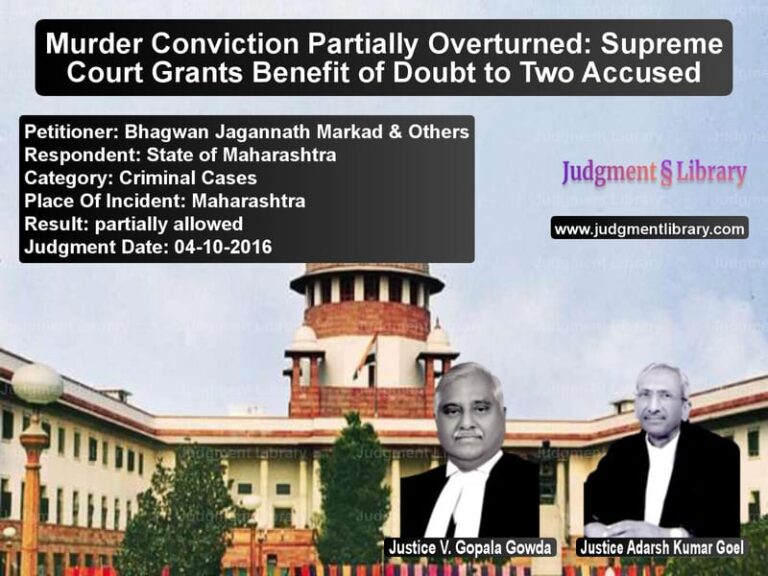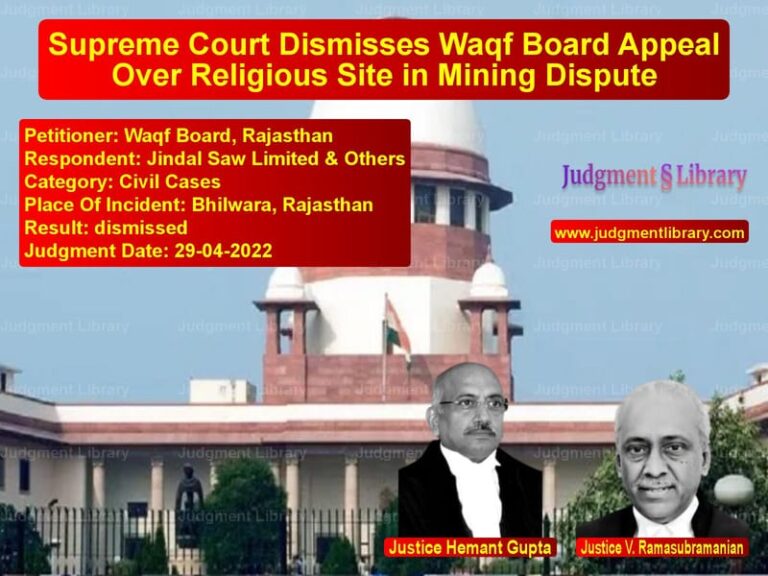Supreme Court Rules on Hindu Succession: Property Rights of Widows Under Section 14
The case of Kallakuri Pattabhiramaswamy (Dead) Through LRs. vs. Kallakuri Kamaraju & Ors. revolves around the interpretation of property rights under Section 14 of the Hindu Succession Act, 1956. The Supreme Court of India, in its judgment dated November 21, 2024, upheld the lower courts’ findings that a Hindu widow’s life interest in certain properties did not transform into absolute ownership under Section 14(1) of the Act.
Background of the Case
The dispute concerns the succession of property between two branches of the same family. The appellant-defendant (now represented through legal representatives) was the son of Kallakuri Swamy from his second wife, Smt. Veerabhadramma, while the respondent-plaintiffs were his sons from his first wife.
The case involves agricultural land measuring 3.55 acres, which was granted to Smt. Veerabhadramma under a partition deed dated August 25, 1933. The deed provided her the right to enjoy the property during her lifetime, with the stipulation that, after her death, the land would be equally divided between the two branches of successors. However, after her demise in 1973, a dispute arose regarding the ownership of the property.
The respondent-plaintiffs filed a suit for partition, claiming equal rights in the property. The appellant-defendant contested the claim, arguing that Smt. Veerabhadramma had executed a will in favor of his lineage, effectively transferring ownership.
Key Legal Issues
- Whether the life interest granted to Smt. Veerabhadramma under the 1933 partition deed transformed into absolute ownership under Section 14(1) of the Hindu Succession Act.
- Whether she had the legal right to bequeath the property through a will.
- Whether the claim for partition by the respondent-plaintiffs was legally valid.
Petitioner’s Arguments
The appellant-defendants contended that:
- Under Section 14(1) of the Hindu Succession Act, a Hindu female’s limited interest in property transforms into full ownership if it was acquired in recognition of a pre-existing right, such as maintenance.
- Since the property was given to Smt. Veerabhadramma in consideration of her right to maintenance, she became the absolute owner after the enactment of the Hindu Succession Act in 1956.
- Consequently, she had the right to execute a will in favor of the appellant-defendant.
Respondent’s Arguments
The respondent-plaintiffs countered with the following points:
- The 1933 partition deed clearly limited Smt. Veerabhadramma’s interest to a life estate, with no absolute ownership rights.
- Since her interest was a restricted estate created through a legal instrument, Section 14(2) of the Hindu Succession Act applied, preventing the conversion of her life interest into absolute ownership.
- The will executed by her was invalid as she did not possess ownership rights over the property.
- The partition should proceed as per the terms of the 1933 deed, giving both branches of the family an equal share.
Supreme Court’s Observations
The Supreme Court analyzed the nature of the property interest and its transformation under the Hindu Succession Act, making the following key observations:
1. Distinction Between Section 14(1) and 14(2) of the Hindu Succession Act
The Court reiterated that Section 14(1) applies to property acquired by a Hindu female in recognition of a pre-existing right, converting limited ownership into absolute ownership. However, Section 14(2) is an exception, which applies to property acquired through a gift, will, or legal instrument that explicitly grants a restricted estate.
2. No Pre-Existing Right in Favor of Smt. Veerabhadramma
The Court found that when the 1933 partition deed was executed, no legal framework existed that granted her a right to maintenance as an enforceable claim against the estate. The Hindu Women’s Right to Property Act, 1937, and the Hindu Succession Act, 1956, were enacted much later. Therefore, the Court concluded:
“The property was not given to her in recognition of any pre-existing right. The recitals of the deed show that she was only allowed to enjoy the scheduled property during her lifetime, without any absolute ownership.”
3. Applicability of Judicial Precedents
The Court relied on previous judgments, including V. Tulsamma vs. Sesha Reddy (1977), where it was held that only property given in recognition of a woman’s pre-existing right to maintenance becomes absolute property under Section 14(1). The Court concluded:
“The partition deed of 1933 did not recognize any legal obligation for maintenance. Hence, Section 14(2) applies, and the restricted estate remains unaffected by the provisions of Section 14(1).”
4. Will Executed by Smt. Veerabhadramma Was Invalid
Since the Court determined that she only had a life interest in the property, it ruled that she could not have legally executed a will transferring ownership. The Court stated:
“A life estate holder cannot dispose of property beyond her lifetime. The will executed by her is, therefore, legally void.”
Final Judgment
The Supreme Court ruled in favor of the respondent-plaintiffs and held:
- The property in question would devolve equally between both branches of the family, as per the original terms of the 1933 partition deed.
- The will executed by Smt. Veerabhadramma had no legal effect.
- The partition suit filed by the respondent-plaintiffs was valid and must be enforced.
- The appeal was dismissed, upholding the concurrent findings of the lower courts.
Impact of the Judgment
This ruling has significant implications for Hindu succession law, particularly regarding the interpretation of Section 14 of the Hindu Succession Act:
- It reaffirms that only property given in recognition of a pre-existing right is converted into absolute ownership.
- It clarifies that property granted under a legal instrument with restricted enjoyment remains a life estate.
- It prevents misuse of Section 14(1) to claim ownership over property where no legal maintenance right existed at the time of acquisition.
By upholding the intent of the original partition deed, the Supreme Court has reinforced the principle that legal instruments creating restricted estates must be honored, ensuring clarity and consistency in property succession matters.
Petitioner Name: Kallakuri Pattabhiramaswamy (Dead) Through LRs..Respondent Name: Kallakuri Kamaraju & Ors..Judgment By: Justice C.T. Ravikumar, Justice Sanjay Karol.Place Of Incident: Andhra Pradesh.Judgment Date: 20-11-2024.
Don’t miss out on the full details! Download the complete judgment in PDF format below and gain valuable insights instantly!
Download Judgment: kallakuri-pattabhira-vs-kallakuri-kamaraju-&-supreme-court-of-india-judgment-dated-20-11-2024.pdf
Directly Download Judgment: Directly download this Judgment
See all petitions in Succession and Wills
See all petitions in Property Disputes
See all petitions in Specific Performance
See all petitions in Judgment by C.T. Ravikumar
See all petitions in Judgment by Sanjay Karol
See all petitions in dismissed
See all petitions in Quashed
See all petitions in supreme court of India judgments November 2024
See all petitions in 2024 judgments
See all posts in Civil Cases Category
See all allowed petitions in Civil Cases Category
See all Dismissed petitions in Civil Cases Category
See all partially allowed petitions in Civil Cases Category







